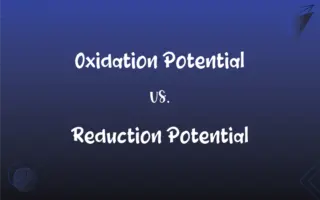Antigen vs. Immunogen: What's the Difference?
Edited by Aimie Carlson || By Janet White || Published on January 18, 2024
Antigens are substances recognized by the immune system, while immunogens are antigens that provoke an immune response.

Key Differences
Antigens are diverse molecules like proteins or polysaccharides that the immune system identifies. They can be part of pathogens, such as viruses or bacteria, or foreign substances. Immunogens, on the other hand, are a subset of antigens capable of inducing an immune response. Not all antigens are immunogens, but all immunogens are antigens.
The specificity of antigens lies in their ability to be recognized by antibodies or immune cells, playing a key role in immunity. They can bind to these components without necessarily triggering a response. Immunogens differ as they actively stimulate the immune system, leading to the production of antibodies or the activation of immune cells.
In the context of vaccines, antigens are the components that are introduced into the body. These may include weakened pathogens or their parts. However, for a vaccine to be effective, these antigens must also be immunogens, meaning they must elicit a protective immune response.
Antigens can be naturally occurring or artificially introduced, acting as markers for the immune system to recognize. Immunogens specifically refer to those antigens that not only get recognized but also elicit an immune reaction, which is crucial for developing immunity.
The study of antigens encompasses understanding how the immune system recognizes various substances, which is fundamental in immunology. Understanding immunogens is essential for designing vaccines and therapies, as they are the active components that initiate an immune response.
ADVERTISEMENT
Comparison Chart
Part of Speech
Noun
Noun
Syllables
Three
Four
Word Origin
From 'antibody generator'
From 'immune generator'
Usage in Sentences
Often used in a general context of immune recognition
Primarily used in the context of inducing an immune response
Associated Fields
Immunology, biology, medicine
Immunology, vaccine development, medicine
ADVERTISEMENT
Antigen and Immunogen Definitions
Antigen
A substance that the immune system can recognize.
The flu virus contains several antigens that are targeted by our immune cells.
Immunogen
A component that activates immune cells.
This specific immunogen activates T-cells to fight the infection.
Antigen
A molecule capable of binding to an antibody or T-cell receptor.
The antigen on the bacteria's surface was quickly identified by antibodies.
Immunogen
An antigen that stimulates antibody production.
The immunogen in the vaccine prompted a strong antibody response.
Antigen
Any foreign substance that triggers an immune recognition.
Pollen grains act as antigens, causing allergic reactions in some individuals.
Immunogen
An antigen that elicits an immune response.
The protein used in the vaccine is an effective immunogen.
Antigen
A component of a pathogen that is recognized by the immune system.
The antigen of the virus was used to develop a targeted vaccine.
Immunogen
A substance capable of inducing immunity.
Scientists are testing the new compound's potential as an immunogen.
Antigen
A marker on cells or molecules that the immune system identifies.
Blood type antigens determine compatibility for transfusions.
Immunogen
A molecule that triggers a specific immune reaction.
Researchers identified a potent immunogen in the pathogen.
Antigen
A molecule that is capable of binding to an antibody or to an antigen receptor on a T cell, especially one that induces an immune response. An antigen is usually a foreign substance, such as a toxin or a component of a virus, bacterium, or parasite.
Immunogen
An antigen that is capable of inducing an immune response.
Antigen
(immunology) A substance that induces an immune response, usually foreign.
Immunogen
(immunology) Any substance that elicits a immune response; an antigen
Antigen
Any substance (as a toxin or enzyme) that stimulates the production of antibodies
Immunogen
Any substance that produces immunity when introduced into the body.
Immunogen
Any substance or organism that provokes an immune response (produces immunity) when introduced into the body
FAQs
What is an immunogen?
An antigen that provokes an immune response.
How do immunogens work in vaccines?
They stimulate immunity without causing disease.
Do antibodies target antigens or immunogens?
Antibodies target antigens.
Can all antigens cause immunity?
No, only immunogens can.
Are vaccines antigens or immunogens?
They contain antigens that are also immunogens.
What is an antigen?
A molecule recognized by the immune system.
Are all immunogens naturally occurring?
No, they can be synthetic or natural.
Do antigens always cause disease?
No, antigens are not always harmful.
How are immunogens selected for vaccines?
Based on their ability to elicit a strong immune response.
Can a person be allergic to an antigen?
Yes, if it triggers an allergic response.
Do immunogens have to be injected?
Not always, some are taken orally.
Do T-cells recognize antigens or immunogens?
T-cells recognize antigens.
How are antigens detected in the laboratory?
Through various immunoassays and tests.
Can an antigen be non-protein?
Yes, antigens can also be polysaccharides or lipids.
What role do immunogens play in immunity?
They initiate and shape the immune response.
Can antigens be part of normal cells?
Yes, as in autoimmune diseases.
Are immunogens used in allergy shots?
Yes, they help build tolerance.
What makes a good immunogen for a vaccine?
Strong immunogenicity with minimal side effects.
Can antigens change over time?
Yes, as in the case of mutating viruses.
Are immunogens always effective in vaccines?
Not always, effectiveness can vary.
About Author
Written by
Janet WhiteJanet White has been an esteemed writer and blogger for Difference Wiki. Holding a Master's degree in Science and Medical Journalism from the prestigious Boston University, she has consistently demonstrated her expertise and passion for her field. When she's not immersed in her work, Janet relishes her time exercising, delving into a good book, and cherishing moments with friends and family.
Edited by
Aimie CarlsonAimie Carlson, holding a master's degree in English literature, is a fervent English language enthusiast. She lends her writing talents to Difference Wiki, a prominent website that specializes in comparisons, offering readers insightful analyses that both captivate and inform.






































































